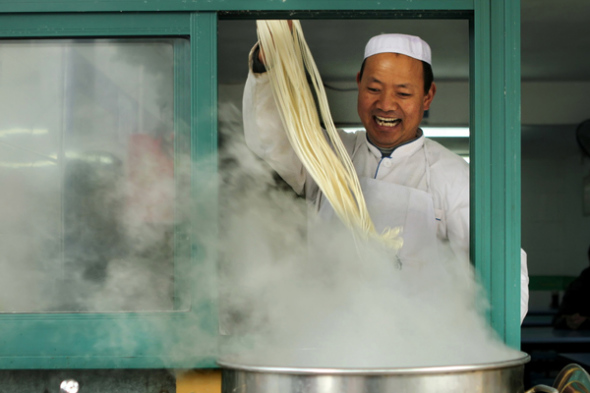
A lamian restaurant owner from Xining, Qinghai province, works in his business in Ningbo, Zhejiang province. (Hu Xuejun / Xinhua)
Many families from Qinghai province are casting off poverty using lamian, or hand-pulled noodles, a local specialty.
Qinghai's hand-pulled noodle businesses generated revenue of 18 billion yuan ($2.6 billion) across China last year. Former farmers who became migrant workers earned a combined salary of nearly 4 billion yuan as a result, according to the human resources and social security department in the province.
Most of those engaged in the noodle business are from Haidong, a city with seemingly endless mountains and deep valleys, which also is known for prolonged droughts. It is one of the poorest areas in China.
In recent years, with government support, an increasing number of local farmers have gone to big cities like Beijing and Guangzhou to open noodle restaurants.
"In a poverty-stricken family with fewer than five members, as long as one of them is in the noodle business, all of them can shake off poverty," said Yang Yi, head of the provincial human resources and social security department.
The province has granted loans of 1.12 billion yuan to about 15,000 locals in Haidong in recent years to help them start businesses, Yang said. It has set up about 90 agencies outside Qinghai to help its migrant workers obtain business certificates, get market information and provide for their children's education.
By the end of 2016, Qinghai's erstwhile farmers had opened some 29,000 lamian restaurants in 280 Chinese cities, accounting for about 40 percent of all such noodle businesses in China.
The restaurants employed 182,000 of former Qinghai farmers, and their annual income per capita exceeded 20,000 yuan. Last year, about 4,000 poor ex-farmers newly employed in the business shook off poverty.
"We will continue to provide preferential policies to support business development in order to help people live better lives," Yang said.


















































